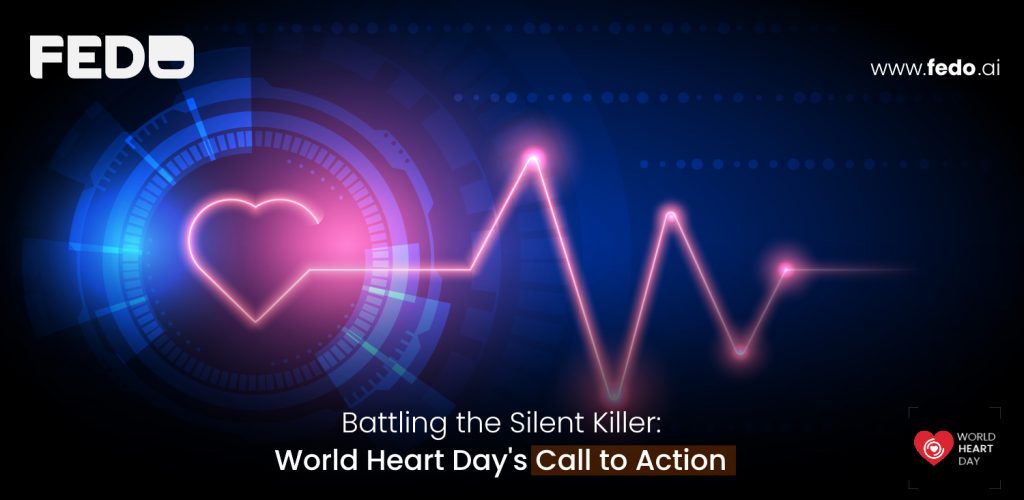
The Silent Assassin Within: World Heart Day’s Urgent Wake-Up Call
Heart disease is a silent epidemic, claiming more lives than all cancers combined. Every year, 17.9 million people worldwide succumb to cardiovascular diseases (CVD), an astonishing number that surpasses the population of Greece. Having a heart attack or stroke not only shatters lives but also puts individuals at a higher risk for another cardiovascular event. On this World Heart Day, let’s delve deeper into these startling facts, especially in the context of India, and explore the causes and potential solutions to this global health crisis.
The Global Crisis: A Looming Catastrophe
In the shadows of our modern world, a silent catastrophe of unprecedented magnitude lurks, poised to inflict its devastating toll on millions of lives each year. The relentless march of Cardiovascular diseases (CVD) has evolved into an escalating epidemic, a menacing specter that claims lives in numbers that defy comprehension. As we confront this chilling reality, it is abundantly clear that we find ourselves at a pivotal juncture, where the imperative to raise awareness and take resolute action transcends mere importance—it becomes an absolute necessity. Let’s uncover the shocking numbers that highlight the harsh reality that urgently needs our attention and action.
i) A Country Wiped Out Every Year: 17.9 Million people die worldwide due to cardiovascular diseases annually, more than the population of Greece. Imagine an entire country getting wiped out from CVD every year.
ii) A Soaring Epidemic: Over the past 30 years, CVD deaths have surged by a staggering 60%. In just three decades, we’ve witnessed a tragic increase from 12.1 million deaths in 1990 to 20.5 million in 2021. This escalating trend is a wake-up call for humanity.
iii) Coronary Heart Disease’s Stealthy Onset: Approximately 200 million people globally are living with coronary heart disease. Among them, around 110 million are men, and 80 million are women. These numbers underscore the pressing need for awareness and action.
India’s Battle: A Closer Look
India is in the anguish of a relentless battle against an alarming adversary: cardiovascular diseases (CVD). This is not a mere health concern; it is an urgent call to action that demands our immediate attention. Prepare to face the stark statistics and pivotal aspects of this pressing issue.
i) A Fifth of Global CVD Deaths: India accounts for a significant portion of global CVD-related deaths, with one in five such deaths occurring within its borders.
ii) A Grim Reality: Shockingly, one in four deaths in India can be attributed to CVD, a statistic that demands immediate attention and preventive measures.
iii) Individuals in Peril: Indians get hospitalized 2-4 times more frequently solely for complications relating to coronary artery disease, highlighting the urgency of addressing this issue among the population.
Exploring the Root Causes
The primary behavioral risk factors for heart disease and stroke are an unhealthy diet, physical inactivity, tobacco use, and harmful alcohol consumption. These behaviors can lead to conditions like high blood pressure, diabetes, high cholesterol, overweight, and obesity, which significantly increase the risk of developing cardiovascular disease.
Targeting Younger Age Groups: The Youthful Battle
In the relentless whirlwind of today’s fast-paced world, the illusion of youth all too often obscures a grave and lurking menace to our health. It offers a deceptive cloak of invincibility, rendering us blind to the insidious risks that our lifestyle choices stealthily impose upon our hearts. This is not a matter to be taken lightly; it demands our unwavering attention and a steadfast dedication to safeguarding our cardiovascular health. Prepare yourselves for the stark revelations that follow:
i) The Deceptive Youth: Youth often mask the warning signs. We may feel young and fit, but beneath the surface, lifestyle choices may be putting our hearts at risk.
ii) Alarming Hospital Admission Rates: Hospital admission rates are 5–10 times higher for people younger than 40 years. It’s a startling statistic that underscores the urgent need for awareness and preventive care.
iii) Youthful Vulnerability: CVD strikes Indians in an age group that is 10 years younger than that of the Western population. It’s a wake-up call that should prompt us to take action now.
A Beacon of Hope
Despite the grim statistics, there’s hope on the horizon. An estimated 80% of cardiovascular disease cases, including heart disease and stroke, are preventable. By choosing a healthier lifestyle, integrating healthcare into our daily routines, and leveraging advancing technology, we can take proactive steps to safeguard our heart health.
Fedo Vitals: A Game-Changer in Heart Health
Now, let’s introduce the game-changer in our quest for healthier hearts – Fedo Vitals:
Fedo Vitals empowers individuals to know their health risk, expected medical costs, and vital signs from a 14-second face scan. Through this innovative technology, individuals can gain invaluable insights into their susceptibility to health issues like CVD, diabetes, hypertension, respiratory problems, CHD, and CKD. They can also monitor vital signs such as blood sugar, blood pressure, hemoglobin, stress levels, BMI, heart rate, HRV-SDNN, respiration rate, oxygen levels, and smoking habits. This enables seamless integration of healthcare into daily life, fostering a healthier and more informed population.
Conclusion
As we celebrate World Heart Day, let’s remember that age is no longer a protective shield against heart issues. The choices we make in our youth profoundly impact our heart health in later years. It’s time for young hearts to take charge of their health and make choices that ensure a future free from the shadows of cardiovascular disease. Embracing innovative technology like Fedo Vitals, which empower individuals to monitor their health risk and vital signs seamlessly, can be a vital step toward a heart-healthy future. Together, let’s walk towards a healthier, happier tomorrow.
If you’d like to learn more or schedule a demonstration, reach out to us at hello@fedo.ai.